THE ROSE THAT GREW FROM CONCRETE - BOOK REVIEW 1
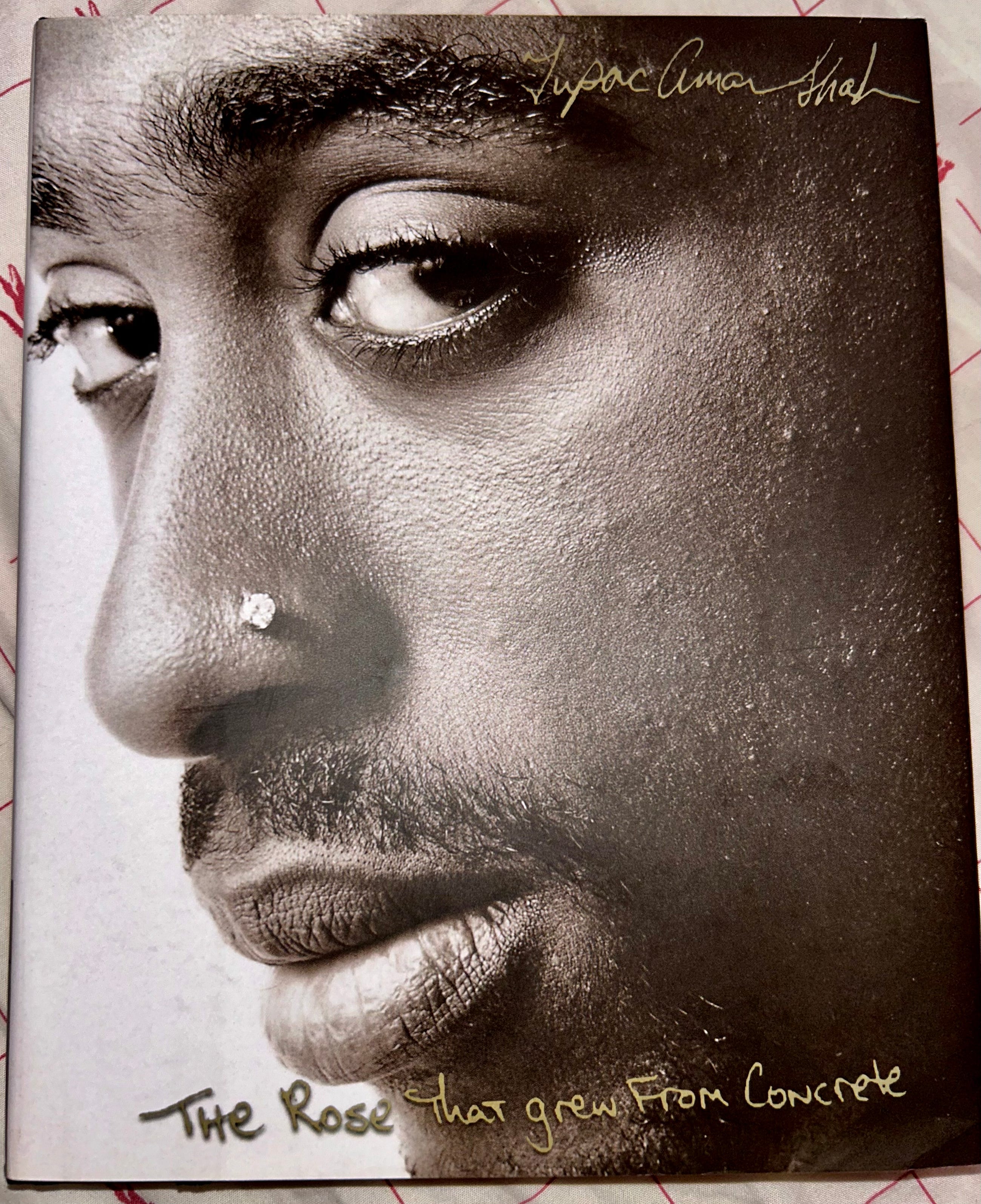
The Rose That Grew from Concrete is a profound and intimate collection of poems by the legendary artist Tupac Shakur. Published in 1999, three years after his untimely death, this posthumous anthology offers a rare glimpse into the inner world of a man known primarily for his revolutionary impact on the hip-hop scene. While Tupac is often celebrated as one of the most influential rappers of all time, The Rose That Grew from Concrete reveals another side of his genius — his talent as a poet, philosopher, and dreamer. making him one of the most influential person in history. I remember finishing this entire book of poems in one day. Many people may say “its poems not much to read”- and yet it is still a form of reading. The Rose that gream From Concrete is very impactful and realistic.
The poems in this collection were written between 1989 and 1991, a time when Tupac was still in his late teens and early twenties. This was before he became the global icon we remember today, a period marked by personal struggles and the formation of his unique voice. The handwritten verses, preserved in their raw and unedited form, are accompanied by typed transcriptions, allowing readers to see both the words and the emotions behind them. The book’s title, drawn from one of the most iconic poems in the collection, symbolizes resilience and the ability to thrive in even the most challenging circumstances — a theme that runs throughout Tupac’s work and life.
In The Rose That Grew from Concrete, Tupac’s poetry explores themes of love, loss, ambition, and social justice with a vulnerability that contrasts with the bravado often associated with his rap persona. The poems speak to his deep sensitivity, his awareness of societal injustices, and his unyielding hope for a better future. They also reflect the duality of his existence — a young man torn between the streets that shaped him and the dreams that propelled him.
This collection not only provides insight into the mind of Tupac Shakur but also serves as a testament to his enduring legacy as an artist who transcended the boundaries of music to become a voice for his generation. It reminds us that beneath the tough exterior was a soul deeply committed to expressing the truths of his experience, not just through rap but through the timeless art of poetry. The Rose That Grew from Concrete is more than just a book; it is a legacy of a young poet whose words continue to inspire and resonate with readers around the world. Including myself.
Born in 1971, Tupac’s life was deeply shaped by the political activism of his parents, who were members of the Black Panther Party. This early exposure to social justice issues emotionally influenced his worldview and later became a central theme in his work. While Tupac’s music is celebrated for its raw portrayal of the struggles and injustices faced by Black communities, his influence extends beyond music. As a poet, Tupac used his verses to explore themes of love, identity, and resistance, giving voice to the pain and hope of a generation. His activism was not just in his lyrics but in his life, as he consistently used his platform to challenge societal norms, speak out against oppression, and advocate for change. Through his poetry and activism, Tupac Shakur left a lasting legacy as a powerful voice for truth and justice, a legacy that continues to resonate today.
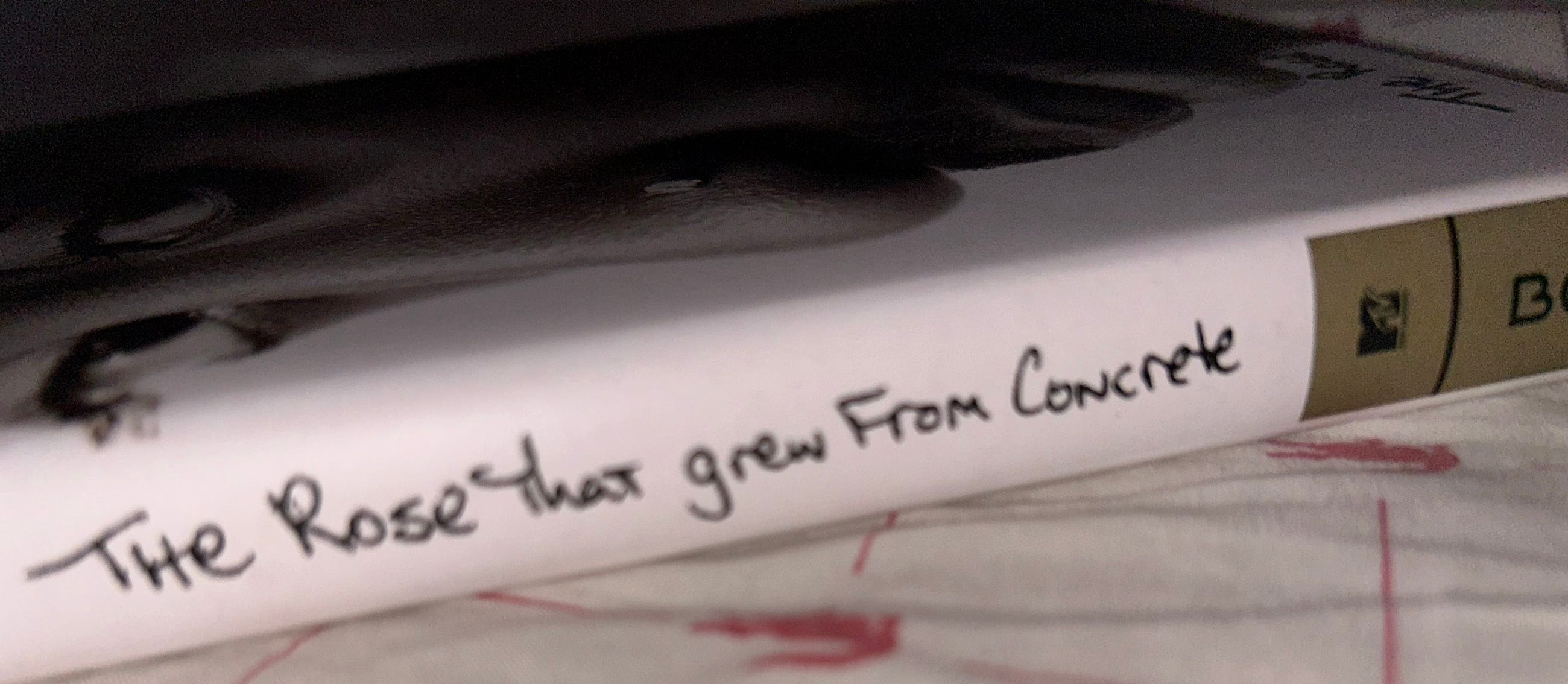
I chose to review The Rose That Grew from Concrete for several reasons. First, this marks a new and more fulfilling chapter in my blogging journey, where I’m focusing on content that resonates deeply with me and my audience. This book, with its powerful and inspiring messages, speaks to me on a personal level — I find myself relating to its themes often. Additionally, I want to create a space where readers can engage in meaningful conversations about the book, exploring its impact and relevance together.

The Rose That Grew from Concrete delves into rich themes that reflect Tupac’s experiences and perspectives. At the heart of the collection are themes of love, pain, social justice, and resilience, each intricately made into the heart of his poetry. These themes are not just explored individually but often intersect, revealing the multifaceted nature of Tupac’s inner world.
Love in this collection is portrayed in its many forms — romantic love, love for family and friends, and a deep, abiding love for humanity. Tupac’s poems often express a longing for connection, understanding, and emotional intimacy, underscoring the vulnerability beneath his public persona. He writes with an open heart, exploring the joys and sorrows that love brings, as well as the challenges of maintaining love in a world filled with hardship, conflict and hatred. The poems reveal a man who, despite his rough exterior, yearned for a sense of belonging and affection. Relating to many men and women in this generation.
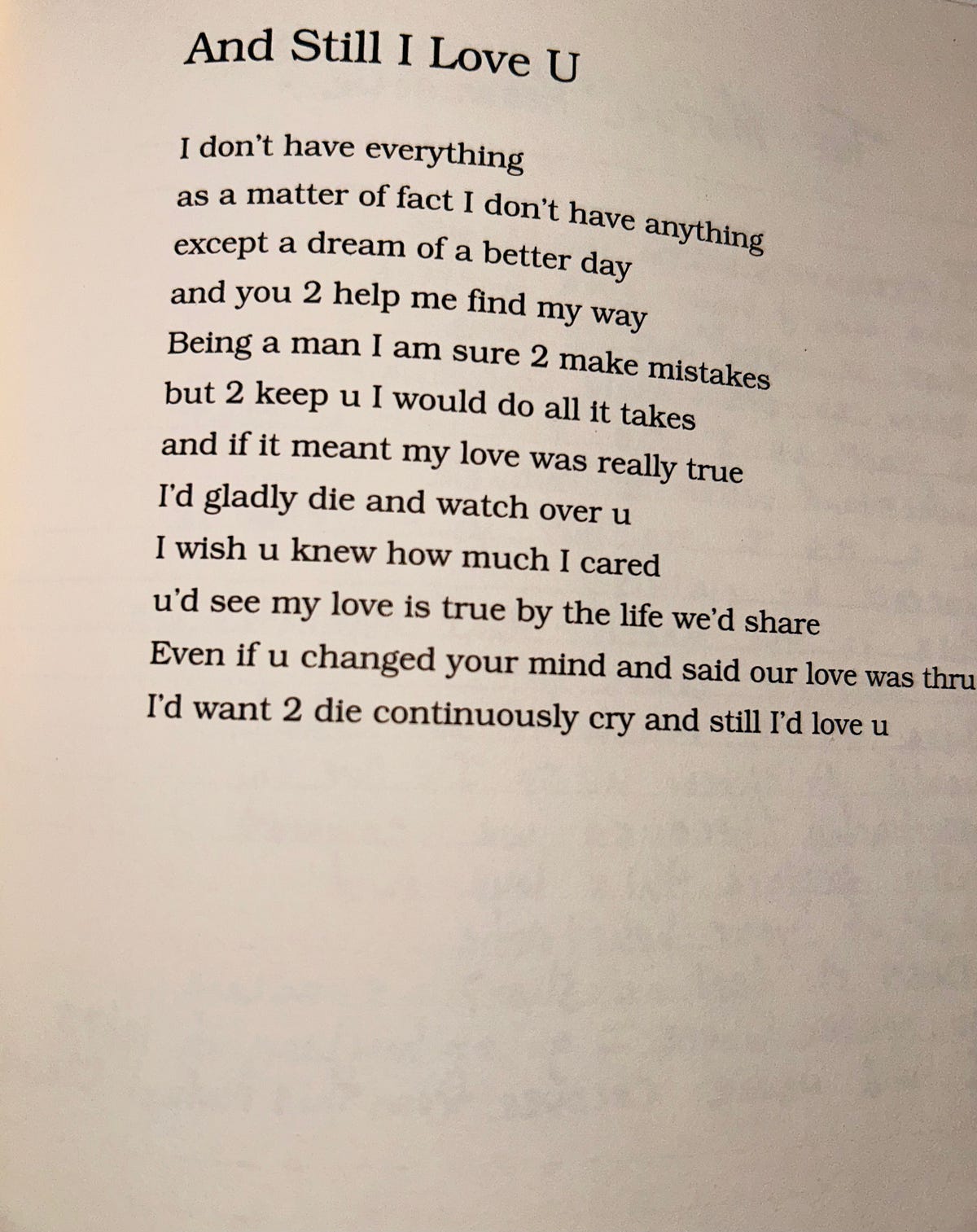

Pain is another central theme, reflecting the struggles Tupac faced throughout his life. His poetry captures the raw emotions of loss, betrayal, and the pervasive sense of injustice that he witnessed and experienced. The pain in his verses is real, often serving as a counterpoint to his expressions of hope and resilience. This duality of suffering and perseverance highlights the depth of Tupac’s emotional world, where the weight of his experiences is both a burden and a source of strength.

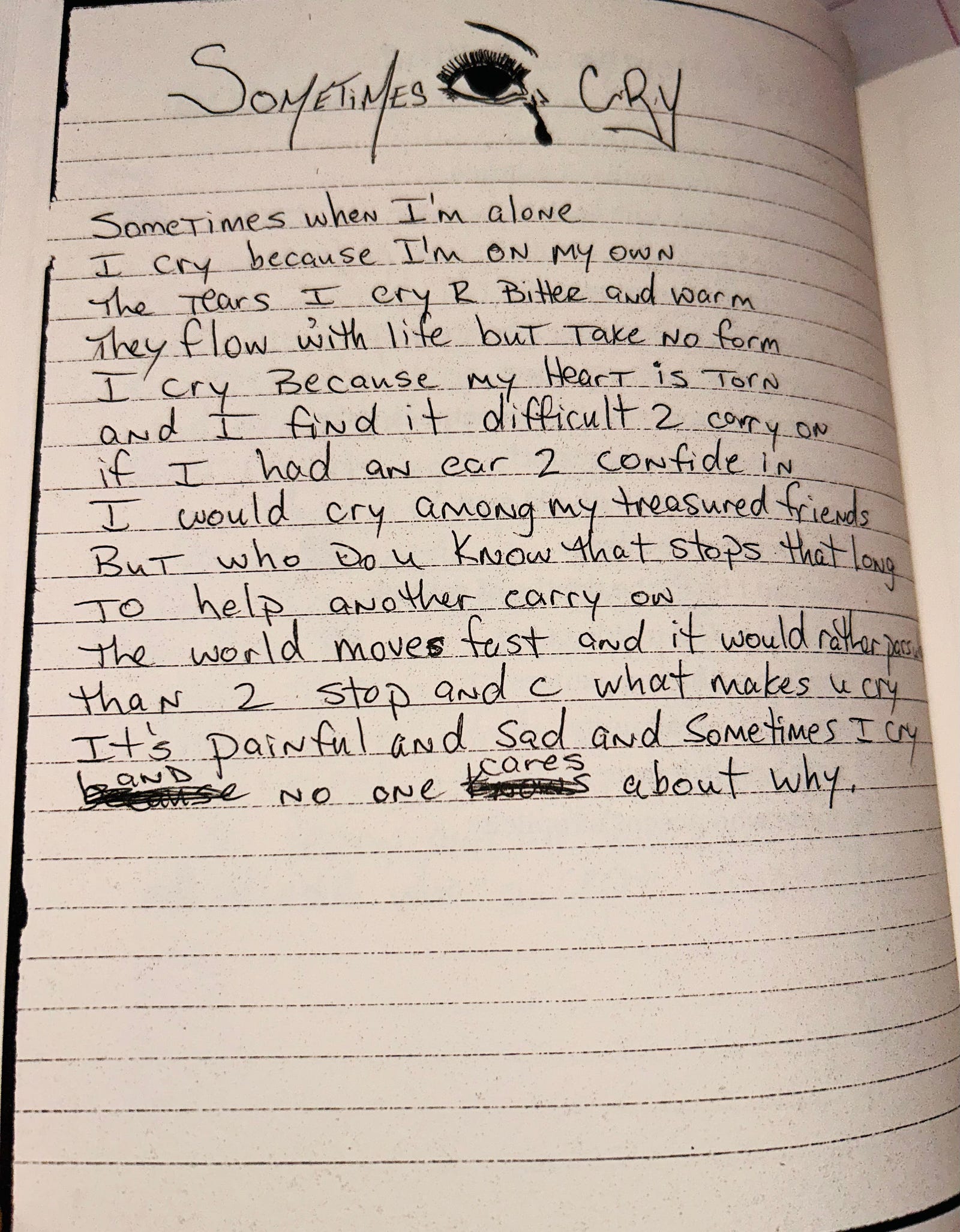
Social justice is a powerful theme in the collection, echoing Tupac’s lifelong commitment to speaking out against the systemic inequalities that plagued his community. His poems address issues such as racism, poverty, and the struggles of Black Americans, offering a critique of the societal structures that perpetuate these injustices. Tupac’s words serve as both a condemnation of the status of government & people and a call to action, urging readers to confront these issues and seek change. His poetry resonates with the anger and frustration of a generation, yet it is also infused with a sense of hope that a better world is possible.
Resilience is perhaps the most defining theme of the collection, encapsulated in the metaphor of the rose that grew from concrete. This theme speaks to the ability to thrive despite the harshest of circumstances, a reflection of Tupac’s own life and the lives of many who come from environments of struggle and deprivation. His poetry celebrates the strength to endure, the will to overcome adversity, and the spirit that refuses to be broken. This resilience is not just about survival but about flourishing in the face of obstacles, embodying the idea that beauty and greatness can emerge from the most unlikely places.
Beyond these primary themes, the collection also explores identity, self-reflection, and dreams. Tupac’s poetry often delves into his sense of self, grappling with the dichotomy between who he was and who he aspired to be. He reflects on his personal growth, his mistakes, and his aspirations, providing readers with an intimate look at his inner journey. The theme of dreams is recurrent, symbolizing both his personal ambitions and his broader hopes for a more just and compassionate world.
In The Rose That Grew from Concrete, these themes come together to form a powerful narrative of a man who lived with passion, fought for what he believed in, and never lost sight of the possibility for change. Tupac’s poetry is a testament to the resilience of the human spirit and a reminder that, even in the face of adversity, there is always hope for something better. This collection is not just a reflection of Tupac’s life but a mirror for readers to see their own struggles, triumphs, and potential for growth.
Personal Reflection
These themes resonate with me because they not only matter in the world we live in today, but they are also central to the book I am writing. My goal is to carry on the legacy of those who came before me while looking forward to a future filled with love and justice. Throughout history, many have fought for change through writing, protest, advocacy, and poetry. Writing and poetry, in particular, have proven to be revolutionary tools for change, enabling people to resonate with others who may be afraid to speak up. What we write and believe cannot be erased from history; it lives on, continually shared and duplicated throughout time, leaving an indelible mark on the world.
Tupac Shakur’s writing style in The Rose That Grew from Concrete is a poignantly blend of raw honesty, evocative imagery, and emotional depth, reflecting both his poetic talent and his personal experiences. His use of language is strikingly direct yet layered, allowing him to convey complex emotions and ideas with remarkable clarity. Tupac often employs a conversational tone, making his poems accessible while still packing a punch. This conversational quality imbues his work with a sense of immediacy and intimacy, drawing readers directly into his world.
Imagery is one of the most compelling aspects of Tupac’s poetry. He has a unique ability to create vivid and often haunting visual scenes that capture the essence of his experiences and observations. For instance, in the titular poem “The Rose That Grew from Concrete,” the metaphor of the rose growing through the concrete symbolizes resilience and hope against overwhelming odds. This imagery not only conveys the beauty and struggle of the human spirit but also serves as a powerful visual representation of overcoming adversity. Tupac’s use of concrete, a harsh, unyielding material, against the delicate, yet resilient rose, creates a striking contrast that underscores the central theme of the poem.

Tupac’s emotional depth is evident throughout the collection. His poems are inspired with a sense of vulnerability that reveals his internal struggles and aspirations. He doesn’t shy away from expressing pain, frustration, or longing, which makes his work resonate deeply with readers who have faced similar experiences. For example, in poems dealing with themes of betrayal or loss, Tupac’s language is often raw and unfiltered, capturing the intensity of his emotions with visceral power. His ability to articulate these feelings with both sensitivity and strength adds a layer of authenticity to his work, allowing readers to connect with his experiences on a personal level.
Moreover, Tupac’s poems often reflect a keen awareness of the social and political issues of his time. He weaves social commentary into his poetic narratives, using language that is both poignant and provocative. His work challenges readers to confront uncomfortable truths about society and themselves, encouraging reflection and dialogue. This combination of personal and political themes enriches his poetry, giving it a broader significance and impact.
Tupac Shakur’s writing style in The Rose That Grew from Concrete is distinguished by its direct language, vivid imagery, and profound emotional depth. His ability to capture the complexities of human experience with such clarity and intensity makes his poetry not only compelling but also deeply meaningful. Through his unique voice, Tupac offers a powerful and enduring contribution to the literary world.
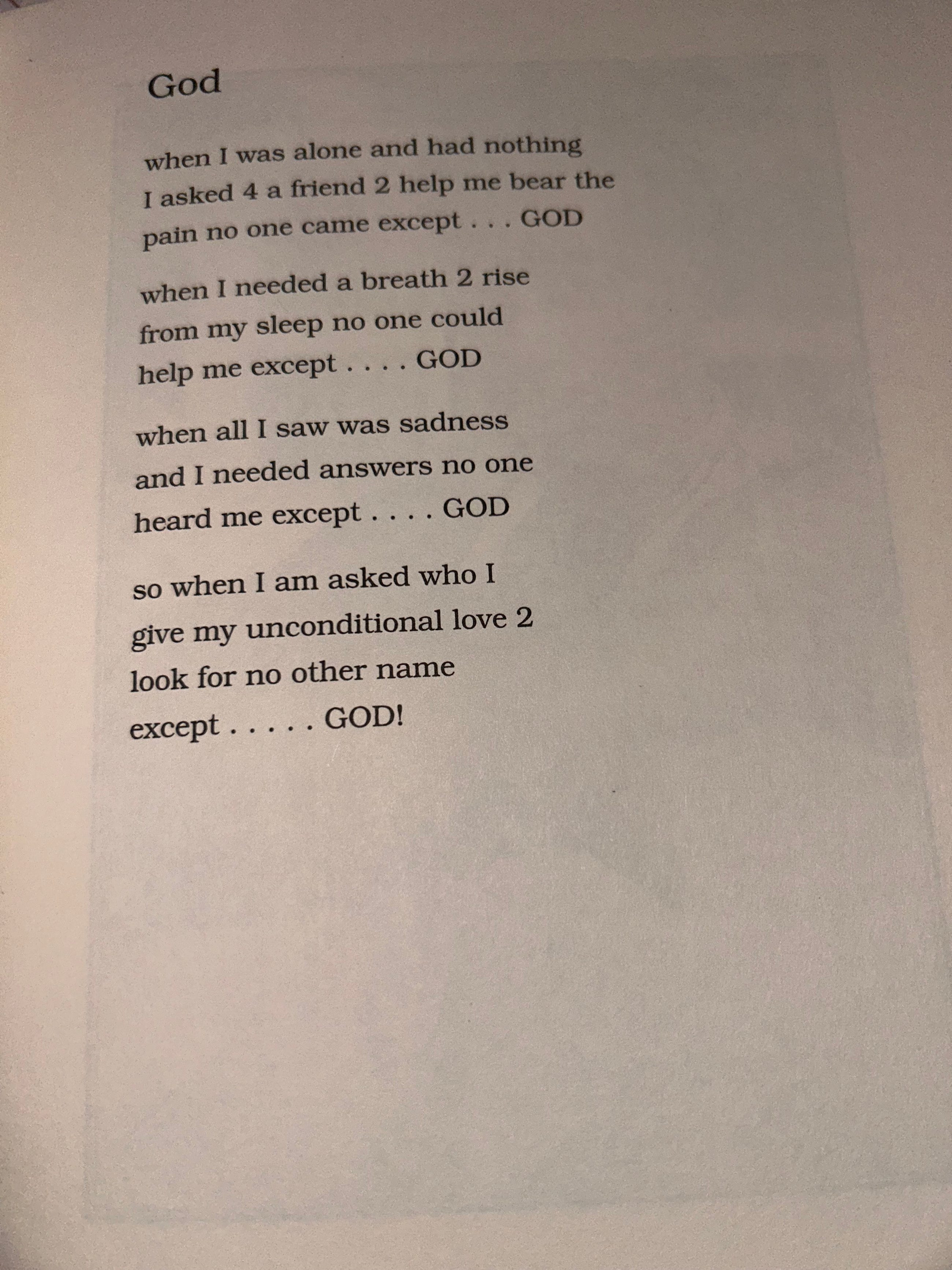
God is one of my favorite poem’s because of its succinct yet powerful exploration of spirituality and human experience. Tupac reflects on the concept of God and the fact that through everything, no human can give him what God gives him, acknowledging in a way that is both intimate and universal. The poem’s brevity belies its depth, as it captures a raw, honest dialogue with the divine.
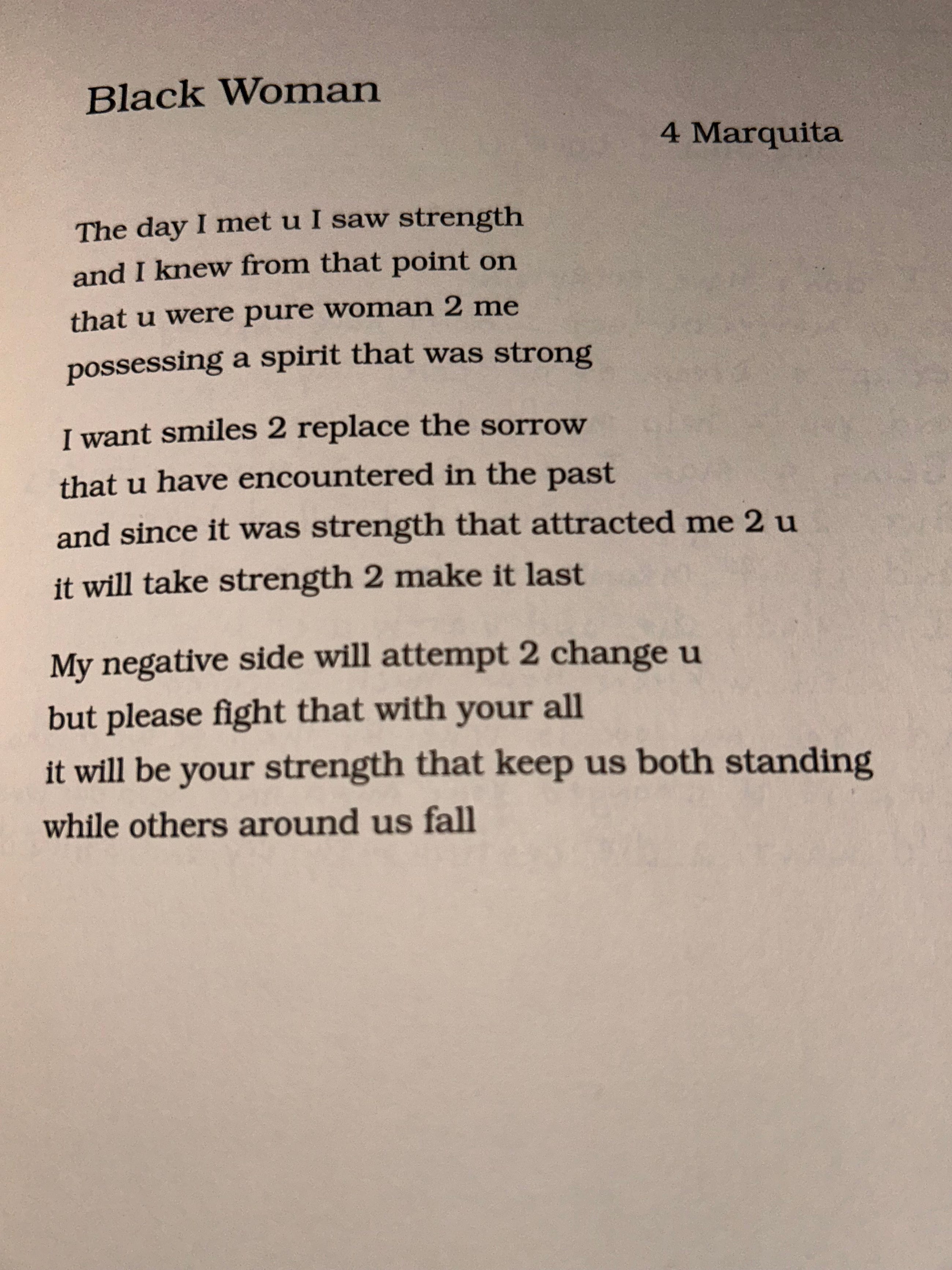
Black Woman is another favorite poem in “The Rose that grew From Concrete” because celebrates the strength and beauty of Black women. The poem’s concise structure effectively honors the resilience and dignity of Black women. And the love that is shared between two people of color.
Tupac Shakur’s work has left an indelible mark on poetry, profoundly influencing both the genre and contemporary literature. His unique voice and approach to writing have reshaped how poetry can address personal and social issues, blending the raw intensity of street life with the introspection of classic poetic forms. Tupac’s poetry stands out for its unflinching honesty and its ability to capture the struggles and triumphs of marginalized communities. His work has broadened the scope of poetry, demonstrating that it can be a powerful vehicle for social commentary and personal expression, accessible to a diverse audience.
Tupac’s influence extends beyond his innovative style; his thematic focus on resilience, social justice, and personal identity resonates deeply in today’s literary landscape. The themes he explored in his poetry continue to be highly relevant in the current social and political climate. Issues of racial inequality, systemic oppression, and the quest for personal dignity are as pressing now as they were during Tupac’s time. His poems address these issues with a rawness and immediacy that remain impactful, reflecting the ongoing struggles and aspirations of those who face similar challenges today.
Moreover, Tupac’s work serves as a bridge between different forms of artistic expression, connecting the worlds of hip-hop and poetry. This fusion has helped to elevate poetry within popular culture, making it more accessible to audiences who might not have engaged with it otherwise. His ability to put together personal narratives with broader social themes has opened up new avenues for poets and writers, encouraging them to address contemporary issues with the same depth and authenticity.
In essence, Tupac Shakur’s poetry continues to resonate because it speaks to fundamental human experiences and societal truths that remain relevant. His voice endures in contemporary literature as a powerful reminder of the capacity of poetry to effect change and foster understanding, bridging personal struggles with collective aspirations. Through his work, Tupac has demonstrated the enduring power of poetry to illuminate, challenge, and inspire, making his contributions to the field both significant and enduring.
The Rose That Grew from Concrete is an impactful collection that deserves a solid 5/5 stars. Tupac Shakur’s poetry is a testament to his extraordinary talent and depth, offering readers a powerful blend of emotional honesty, vivid imagery, and insightful commentary. The book’s exploration of themes like resilience, love, and social justice is both moving and thought-provoking, making it a compelling read for anyone interested in poetry that speaks to the heart of human experience.
I highly recommend this collection to others, especially those who often feel misunderstood or find solace in art that reflects their own struggles and aspirations. Tupac’s words resonate deeply with anyone who has faced adversity or yearned for a voice that captures the complexities of their own life experiences.
For those who are inspired by this collection, I encourage you to dive deeper into Tupac’s work, exploring both his poetry and his music. Share your thoughts on the book, engage in discussions about its themes, and discover how Tupac’s unique perspective continues to influence and inspire. His work remains a powerful force for reflection and change, and engaging with it offers valuable insights into both his world and our own.
As we wrap up our exploration of The Rose That Grew from Concrete, I’d love to hear from you! What are your thoughts on Tupac Shakur’s poetry? Do you have a favorite poem from the collection that particularly resonates with you? How do you think Tupac’s legacy continues to impact contemporary literature and social discourse?
Feel free to share your reflections, favorite lines, or personal connections to the themes in the book in the comments section. I would love to foster a community discussion around Tupac’s remarkable work and its enduring relevance. Your insights and perspectives are valuable, and I’m excited to hear what you think!!!!!


thank you for this !!!!💙
ReplyDeleteBy the grace of God your platform will blow up and be one of the biggest and most inspirational platforms there is
ReplyDeleteThis is incredible!!!!❤️❤️❤️
ReplyDelete